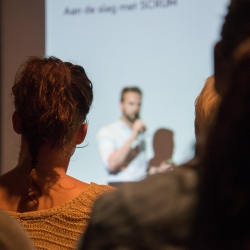November 26, 2021
Doing what you love may not automatically make you happier at work
 There is a classic saying which has shaped our job choices for years: “Do what you love, the money will follow.” New research suggests this may be true, although not in the way it was originally conceived. The typical logic train has suggested job interest shapes satisfaction and, in turn, satisfaction may drive better performance. However, new research published in the Journal of Vocational Behavior provides some fresh perspectives. It turns out satisfaction has many facets. While interest is one component in job satisfaction, it is not the primary component. Elements such as the organization, relationships with colleagues, leadership and compensation are actually more important than interest in predicting satisfaction. More →
There is a classic saying which has shaped our job choices for years: “Do what you love, the money will follow.” New research suggests this may be true, although not in the way it was originally conceived. The typical logic train has suggested job interest shapes satisfaction and, in turn, satisfaction may drive better performance. However, new research published in the Journal of Vocational Behavior provides some fresh perspectives. It turns out satisfaction has many facets. While interest is one component in job satisfaction, it is not the primary component. Elements such as the organization, relationships with colleagues, leadership and compensation are actually more important than interest in predicting satisfaction. More →







 Due to the significant workplace technology changes brought on by the pandemic, more than half (53 percent) of employers plan extensive organisational transformation in the next two years.
Due to the significant workplace technology changes brought on by the pandemic, more than half (53 percent) of employers plan extensive organisational transformation in the next two years. 
 New research, ‘
New research, ‘
 Employers looking to retain talent during the so-called ‘Great Resignation’ may benefit from investing in more management training for their staff, according to
Employers looking to retain talent during the so-called ‘Great Resignation’ may benefit from investing in more management training for their staff, according to 
 A new report ‘
A new report ‘
 Architects and designers have always a had a thing for door handles. It’s the kind of detail they like and one of the most genuinely tactile features of a building. Architects from Frank Gehry to Zaha Hadid have worked on the designs of door handles for manufacturers.
Architects and designers have always a had a thing for door handles. It’s the kind of detail they like and one of the most genuinely tactile features of a building. Architects from Frank Gehry to Zaha Hadid have worked on the designs of door handles for manufacturers. 
 A flexible work culture is a key consideration for the majority of young workers when choosing a job, with over half (53 percent) of 18-34-year-olds claiming that talented young people won’t join companies that are inflexible about the way their people choose to work.
A flexible work culture is a key consideration for the majority of young workers when choosing a job, with over half (53 percent) of 18-34-year-olds claiming that talented young people won’t join companies that are inflexible about the way their people choose to work. 
 British workers took the seventh lowest number of sick days in Europe last year, according to new
British workers took the seventh lowest number of sick days in Europe last year, according to new 
 More than half of the nation’s employers (53 percent) feel that they don’t know their employees even slightly well on a personal level, claims a new office worker survey.
More than half of the nation’s employers (53 percent) feel that they don’t know their employees even slightly well on a personal level, claims a new office worker survey. 


 Ricoh UK has published a report called
Ricoh UK has published a report called 










